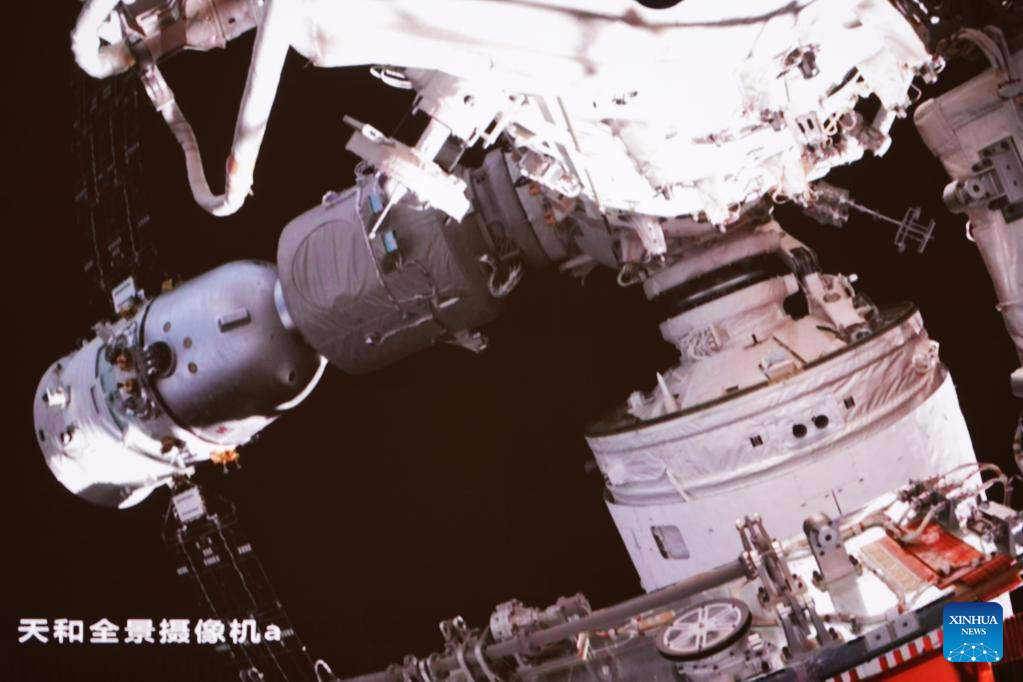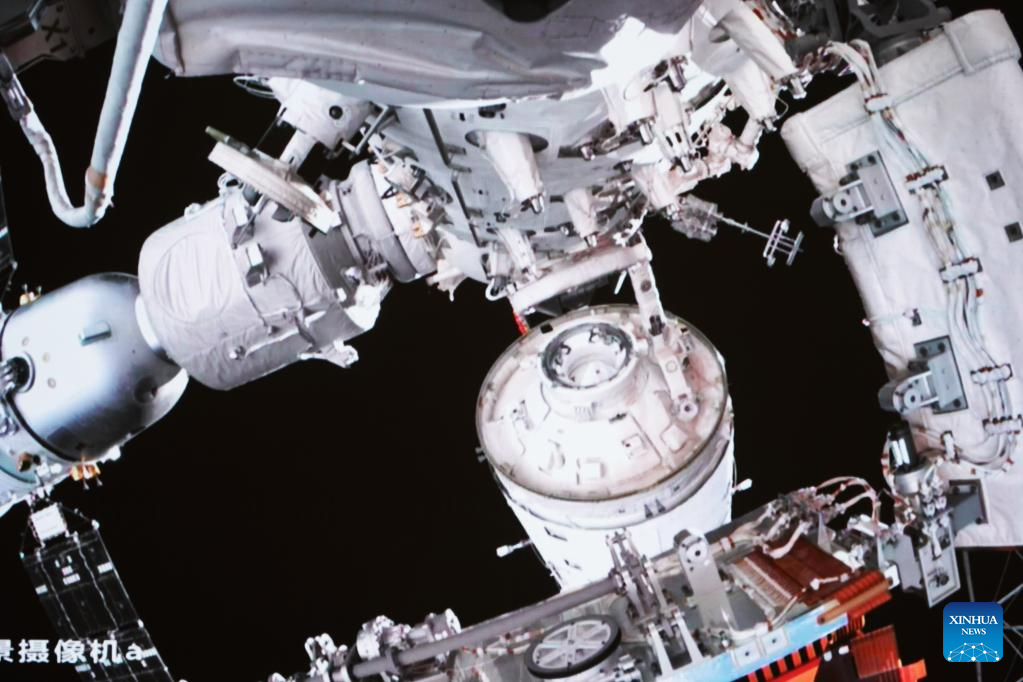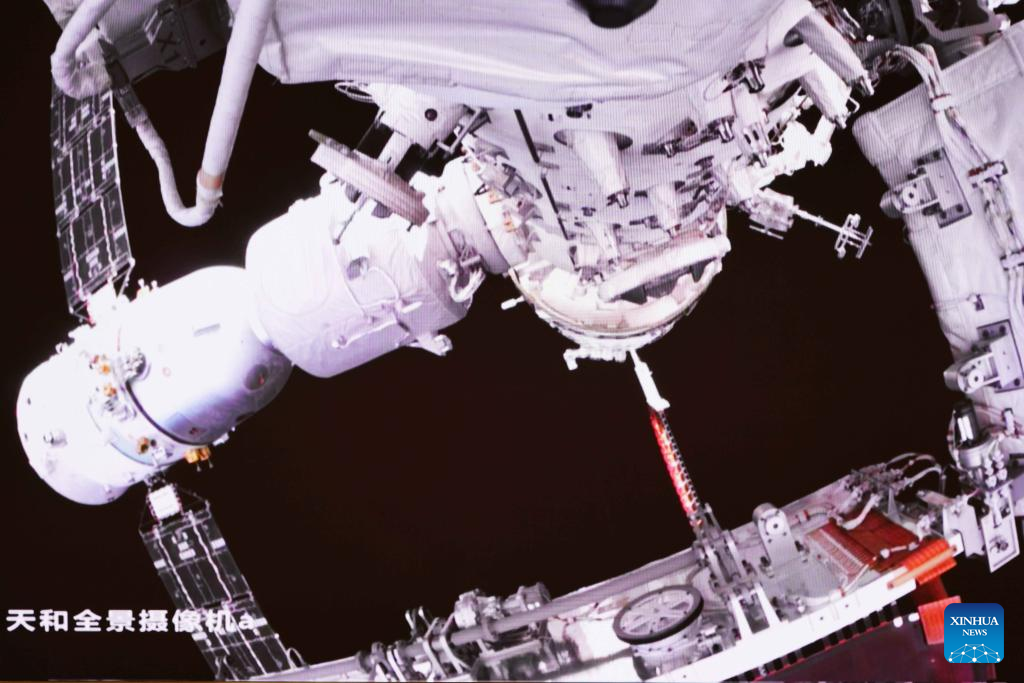
Screen image captured at Beijing Aerospace Control Center on Sept. 30, 2022 shows the Wentian lab module completing transposition and docking with the side port of the space station's node cabin.
China's space station lab module Wentian successfully completed in-orbit transposition at 12:44 p.m. Friday, according to the China Manned Space Agency (CMSA).
It was the first time China has completed the in-orbit transposition of a large-scale spacecraft cabin by applying transfer facilities, the CMSA said.
During the transposition, the Wentian lab module first completed its state configuration and separated from the space station's core module Tianhe. Following up, Wentian conducted transposition and then docked with the side port of the space station's node cabin.
Lasting around one hour, the operation was the result of cooperation between astronauts in space and professionals on Earth, the agency said. (Xinhua/Guo Zhongzheng)
BEIJING, Sept. 30 (Xinhua) -- China's space station lab module Wentian successfully completed in-orbit transposition at 12:44 p.m. Friday, according to the China Manned Space Agency (CMSA).
It was the first time China has completed the in-orbit transposition of a large-scale spacecraft cabin by applying transfer facilities, the CMSA said.
During the transposition, the Wentian lab module first completed its state configuration and separated from the space station's core module Tianhe. Following up, Wentian conducted transposition and then docked with the side port of the space station's node cabin.
Wentian was moved to the same plane as the core module to ensure the path of its barycenter also stays on the same plane, thus reducing possible disturbances to the space station combination, said Wei Zhi, an engineer from the Shanghai Academy of Spaceflight Technology, a subsidiary of the China Aerospace Science and Technology Corporation.
Lasting around one hour, the operation was the result of cooperation between astronauts in space and professionals on Earth, the agency said.
Through the transposition, the combination has changed from a straight line to L-shape. After the arrival of the Mengtian lab module, the three-module combination will be maneuvered to take on a T-shape.
The Mengtian module is set to be launched in October this year. ■

Screen image captured at Beijing Aerospace Control Center on Sept. 30, 2022 shows the Wentian lab module separating from the space station's core module Tianhe and conducting transposition. China's space station lab module Wentian successfully completed in-orbit transposition at 12:44 p.m. Friday, according to the China Manned Space Agency (CMSA).
It was the first time China has completed the in-orbit transposition of a large-scale spacecraft cabin by applying transfer facilities, the CMSA said.
During the transposition, the Wentian lab module first completed its state configuration and separated from the space station's core module Tianhe. Following up, Wentian conducted transposition and then docked with the side port of the space station's node cabin.
Lasting around one hour, the operation was the result of cooperation between astronauts in space and professionals on Earth, the agency said. (Xinhua/Guo Zhongzheng)

Screen image captured at Beijing Aerospace Control Center on Sept. 30, 2022 shows the Wentian lab module preparing to conduct transposition. China's space station lab module Wentian successfully completed in-orbit transposition at 12:44 p.m. Friday, according to the China Manned Space Agency (CMSA).
It was the first time China has completed the in-orbit transposition of a large-scale spacecraft cabin by applying transfer facilities, the CMSA said.
During the transposition, the Wentian lab module first completed its state configuration and separated from the space station's core module Tianhe. Following up, Wentian conducted transposition and then docked with the side port of the space station's node cabin.
Lasting around one hour, the operation was the result of cooperation between astronauts in space and professionals on Earth, the agency said. (Xinhua/Guo Zhongzheng)



